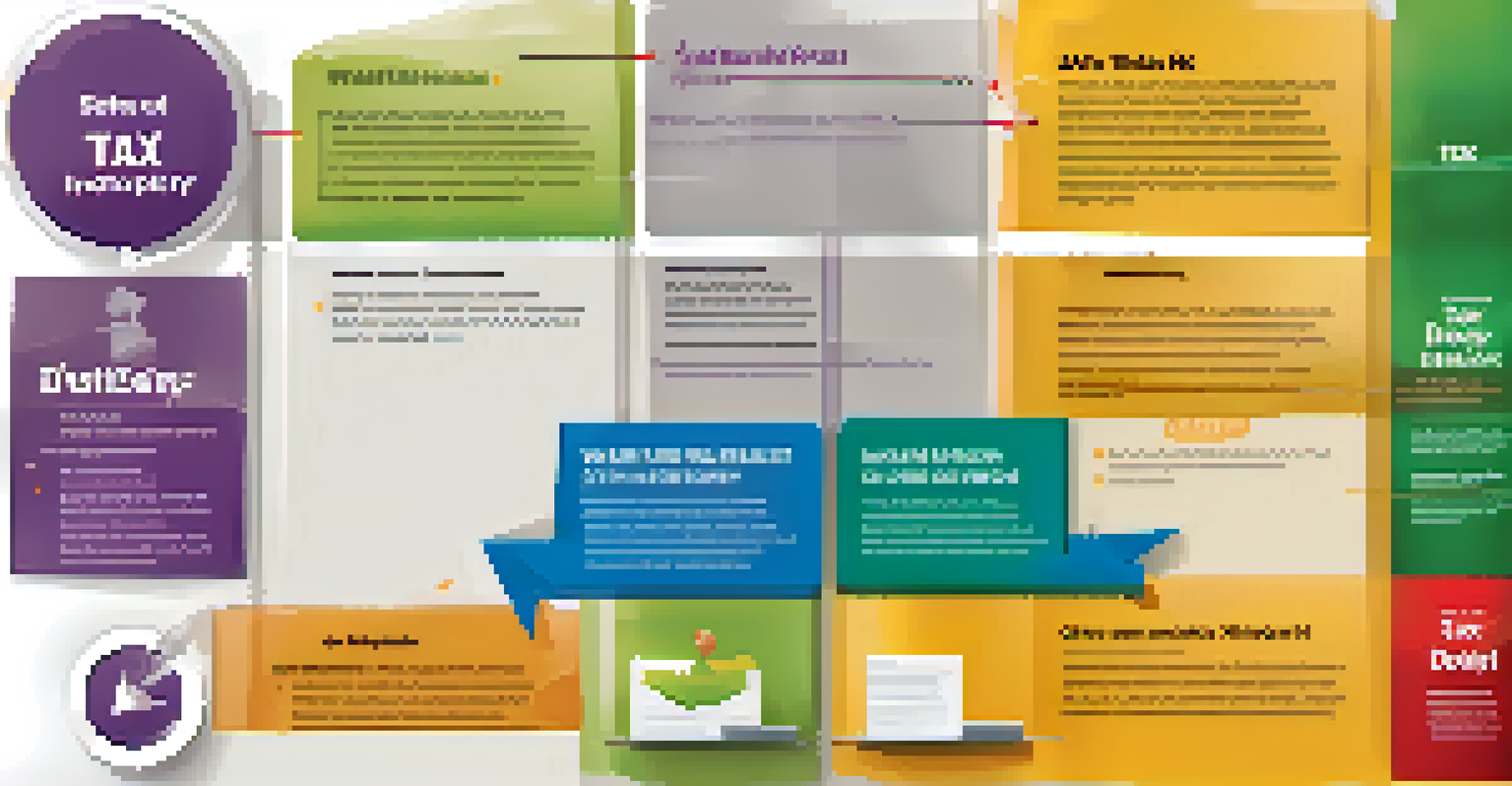Common Tax Refund Delays: What You Need to Know

Understanding Tax Refund Delays: An Overview
Tax refund delays can be frustrating and confusing for many taxpayers. Understanding why these delays happen is the first step in addressing them. Common reasons often include issues with your tax return, such as missing information or discrepancies.
The only thing certain in life is death and taxes.
Another key factor is the time of year; filing closer to the tax deadline can increase the chances of delays. The IRS processes millions of returns, and during peak times, their resources can be stretched thin. Keeping informed about these factors can help you manage your expectations.
In the following sections, we’ll dive deeper into specific reasons for delays and how you can navigate them effectively. From submitting errors to external factors like fraud prevention, being informed is essential for a smooth tax season.
Filing Errors: A Common Culprit
One of the most frequent reasons for tax refund delays is filing errors. Simple mistakes like misspelled names, incorrect Social Security numbers, or math errors can hold up your return. These errors can lead to a longer review process, leaving you in limbo.

It’s essential to double-check your return before submitting it. Many taxpayers find it helpful to use tax software that can catch common mistakes. Alternatively, having a trusted tax professional review your documents can make a significant difference.
Filing Errors Cause Refund Delays
Common mistakes like incorrect names or numbers can significantly delay your tax refund processing.
By taking the time to ensure accuracy, you can minimize the chances of delays. Remember, a little extra attention to detail can save you a lot of waiting time down the road.
Missing Documentation Can Delay Your Refund
Submitting your tax return without the necessary documentation is another common issue. Missing forms, like W-2s or 1099s, can cause significant setbacks. The IRS requires complete and accurate information to process your return efficiently.
An ounce of prevention is worth a pound of cure.
To avoid this, gather all your financial documents well in advance of tax season. Create a checklist of required forms to ensure that nothing is overlooked. This proactive approach can help streamline your filing process.
If you realize that you’ve submitted your return without certain documents, don’t panic. You can file an amendment, but be prepared for additional processing time. Being organized from the start is key to avoiding these hiccups.
Identity Verification and Fraud Prevention
The IRS is committed to preventing tax fraud, which can sometimes lead to delays in processing refunds. If your return raises any flags, you may be asked to verify your identity, which can extend the review period. This is a precautionary measure to protect both taxpayers and the government.
If you receive a notice requesting additional verification, respond promptly with the required information. Delaying your response can prolong your wait for a refund. It’s essential to stay vigilant and respond to any IRS communications as soon as possible.
Direct Deposit Speeds Up Refunds
Choosing direct deposit can expedite the arrival of your tax refund directly into your bank account.
While these measures are in place to protect you from fraud, they can also create delays. Understanding this process can help you be more patient while waiting for your refund.
Choosing Direct Deposit for Faster Refunds
Opting for direct deposit is one of the best ways to speed up the receipt of your tax refund. Direct deposit allows the IRS to transfer your refund directly into your bank account, often within days of processing your return. This method reduces the risk of delays associated with mailing a physical check.
To ensure a smooth direct deposit experience, double-check your bank account information when filing your return. Any errors in your account number can lead to significant delays or misdirected funds. Always use the correct routing and account numbers to avoid any complications.
If you haven’t chosen direct deposit in the past, consider it this tax season. It’s a simple change that can enhance your experience and bring your refund to you quicker.
State-Specific Delays: What to Watch For
While many taxpayers focus solely on federal refunds, state-specific delays can also impact your overall refund experience. Each state has its own tax laws and processing times, which can vary significantly. If you file your state tax return late or inaccurately, it can lead to a domino effect on your federal refund.
Being aware of your state’s filing deadlines and requirements is crucial. Check your state’s tax website for updates and processing times, especially during peak tax season. This knowledge can help you better anticipate any potential delays.
Stay Informed on State Delays
Being aware of state-specific tax laws and deadlines is crucial to avoid delays in your overall refund process.
In addition, some states may have their own fraud prevention measures in place, similar to the IRS. Understanding these can give you a clearer picture of what to expect and help you avoid unnecessary hold-ups.
How to Track Your Tax Refund Status
Staying informed about your tax refund status is easier than ever thanks to online tools provided by the IRS. You can use the 'Where's My Refund?' tool to track your refund’s progress. This resource allows you to see when your return was received and when your refund is scheduled to be issued.
Before using this tool, make sure you have your Social Security number, filing status, and the exact refund amount handy. This information will help you access your specific details without any hassle. Regular checking can also keep you updated on any potential issues that may arise.

If you notice that your refund is taking longer than expected, it’s wise to contact the IRS directly. They can provide more insight into any delays and guide you on how to resolve them.
Final Thoughts: Stay Prepared for Tax Season
Tax season can be a stressful time, but understanding the common reasons for delays can help you stay prepared. By being proactive in your filing process, double-checking your information, and opting for direct deposit, you can minimize the risk of delays. Preparation is truly your best ally during this time.
Additionally, staying informed about state-specific requirements and utilizing online tracking tools can enhance your experience. Knowledge is power, and the more you know about the process, the smoother it will be.
As you navigate through tax season, remember that patience is key. Refund delays can happen, but by following these tips, you can ensure you’re doing everything possible to receive your refund promptly.